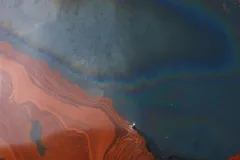Article
Let's Get Our Hands Dirty This Women's History Month

In the ocean world, there are many women to celebrate during Women’s History Month. Consider Rachel Carson, who started her career as a marine biologist, Sylvia Earle (“Her Deepness”), or our very own Nancy Knowlton, a self-proclaimed #OceanOptimist after years of coral reef doom and gloom.
This March, we are narrowing down the list by interviewing researchers who have gotten their hands dirty—literally. The women scientists featured here are all making history by contributing to the science surrounding the Gulf Oil Spill. Find out how they initially got interested in their research and what they find the most exciting:
- Lexi Temkin explores the links between the Deepwater Horizon oil spill and human health. She focuses on how chemicals, like those released into the Gulf of Mexico during the Deepwater Horizon oil spill, could cause cells to develop differently or change.
- Nancy Rabalais is a MacArthur “genius grant” recipient. She studies “dead zones"—areas of low- or no-oxygen water along the seafloor that suffocates most animal life in the waters of the Gulf of Mexico
- Uta Passow studies the movement of carbon into and around the ocean in the “biological carbon pump.” She explores how the Deepwater Horizon oil spill affected the movement of carbon in the ocean and helped to determine where the oil actually made its way.
We hope you are celebrating the contributions of women to science—past and present—this month!

